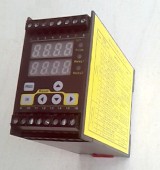| Guidance 指路人 g.yi.org |
Software / Reginald / Examples / mailslot / serverslot.rex |
|
/* An example of using Reginald REXX to FUNCDEF * and use Windows Mail Slots. * * This is the script that runs on the server * computer. It creates a mailslot and waits for * records sent from the respective script that * runs on the client (ie, clientslot.rex). */ /* So that we don't need the CALL keyword */ ADDRESS null /* Some OS functions deal with 32-bit addresses so we need * 10 digits to prevent dealing with exponential form */ NUMERIC DIGITS 10 /* ============== FUNCDEF some needed OS functions ============ */ /* Make things easy for us with WINFUNC option */ OPTIONS "WINFUNC NOSOURCE" /* Trap FAILURE/SYNTAX so we don't have to check FUNCDEF for errors */ /* Trap HALT for user abort and cleanup */ SIGNAL ON FAILURE SIGNAL ON SYNTAX SIGNAL ON HALT /* Register the Windows OS function CreateMailslot(). We tell it to check * for a return of -1, and if so, raise USER 1 condition. */ FUNCDEF("CreateMailslot", "void, str, 32u, 32, void", "kernel32",,"U1 -1") /* Register the Windows OS function GetMailslotInfo(). We tell it to check * for a return of 0, and if so, raise USER 1 condition. */ FUNCDEF("GetMailslotInfo", "32, void, 32u *, 32 * stor, 32u * stor, 32u * dual", "kernel32",,"U1 0") /* Register the Windows OS function ReadFile(). We tell it to check * for a return of 0, and if so, raise USER 1 condition. */ FUNCDEF("ReadFile", "32, void, void, 32u, 32u * stor, void", "kernel32",,"U1 0") /* Register the Windows OS function CloseHandle() */ FUNCDEF("CloseHandle", "32, void", "kernel32") /* First let's trap USER 1 so we don't have to error check * any of these calls to the above FUNCDEF'ed functions. Yay! */ SIGNAL ON user 1 NAME mailsloterror /* Create a mail slot named testslot in the current directory, * allowing any size records to be received (up to 64K). * Specify that we want ReadFile() to wait forever when reading * a record. */ handle = createmailslot("\\.\mailslot\testslot", , -1) /* Trap USER 1 so we don't have to error check with the * MailSlot functions */ SIGNAL ON user 1 NAME mailsloterror2 /* Trap SYNTAX in case CONVERTDATA has a memory allocation failure */ SIGNAL ON SYNTAX NAME mailsloterror2 again: /* Wait for the next record to be received at the mailslot. Wait up * up to 10000 milliseconds before returning. */ err = 10000 CALL getmailslotinfo(handle, , msgsize, , err) /* Here you may want to check for user aborting if using some sort * of graphical user interface, and SIGNAL to HALT. You may also want * to clear out messages at the window. For example, with REXX Dialog, * you'd do a RXMSG 'CLEAR' operation. */ /* Check if there was a record. If so, the size is not -1 */ DO WHILE msgsize \= -1 /* Allocate memory to read in the record. If an error, * REXX will raise SYNTAX */ buffer = CONVERTDATA(0, msgsize, , "A") /* Read the record */ CALL readfile(handle, buffer, msgsize, numread) /* Make sure all the chars were read */ IF msgsize \= numread THEN SAY "ERROR: The correct number of characters weren't received!" ELSE DO /* Assign the record chars to the REXX variable named "buffer" */ CALL CONVERTDATA(buffer, "buffer", , "=") /* Display the received record. Here you'd normally do something useful with it */ SAY buffer END /* Read the next message's size */ CALL getmailslotinfo(handle, , msgsize) END /* msgSize \= -1 */ /* Delay for 60 seconds so we don't eat up too much CPU time */ SLEEP(60) /* Wait for next record */ SIGNAL again mailsloterror2: /* If we're here, then there was a problem reading a record. We'll * just report that and skip to the next record. */ SAY CONDITION('D') "failed:" UNIXERROR(RXFUNCERRMSG()) SIGNAL again /* ======================= Error Handling ======================= */ mailsloterror: /* NOTE: For a USER condition raised by some FUNCDEF'ed function, * CONDITION('D') fetches the name of function that was called. * CONDITION('E') fetches the return value of the function. SIGL * is the line number where the error occurred. RXFUNCERRMSG() * can return any real error number from the operating system, and * UNIXERROR() can display an appropriate message for that error. */ SAY CONDITION('D') "failed:" UNIXERROR(RXFUNCERRMSG()) SIGNAL HALT syntax: failure: /* NOTE: CONDITION('D') fetches error message. CONDITION('E') fetches the * error number. SIGL is the line number where the error occurred. */ CONDITION('M') halt: /* Close the mailslot. Actually, Windows will do this for us if the * program that also launched this script is ending now. */ IF SYMBOL(handle) == 'VAR' THEN closehandle(handle) RETURN |
|
| © Sat 2026-2-14
Guidance Laboratory Inc. Email:webmaster1  g.yi.org Hits:0 Last modified:2013-06-18 23:40:59 g.yi.org Hits:0 Last modified:2013-06-18 23:40:59
|
 |
|||
|
|
 搜索
搜索 论坛
论坛 Home
Home 回顶部
回顶部







